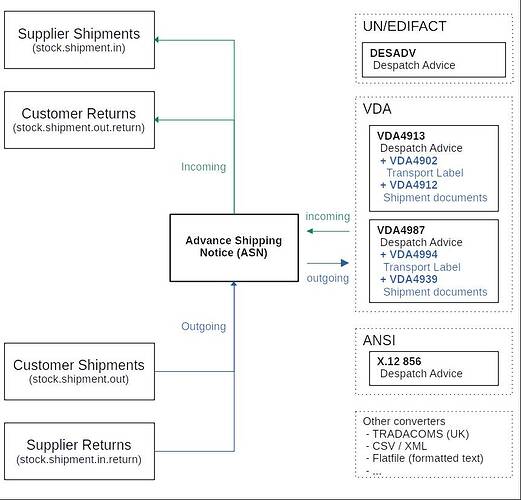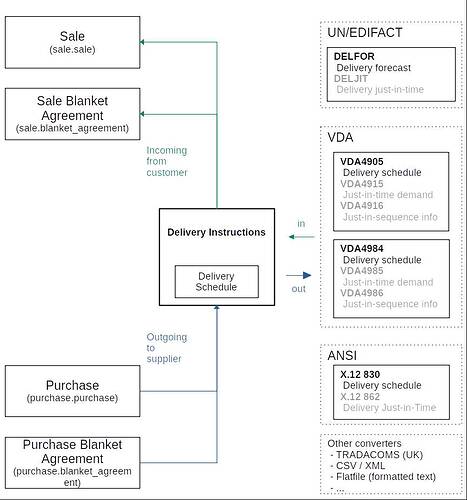One of our customers would be willing to switch to Tryton, when sending EDI Despatch Advices in VDA4913 format (and printing the corresponding labels and shipment documents) would be possible.
While I can fulfill this special requirement for this single customer on my own (by help of third party software, converters and some config files), I would rather like to have EDI features integrated in Tryton.
This thread is to ask if others are also interested in having Tryton EDI modules.
In that case I would create a detailed blueprint.
Here is my rough (simplified) idea:
We have one “basic” module per EDI “sector”, for example
- Delivery Instructions (DELINS)
- Despatch Advice (DESADV), aka Advance Shipping Notice (ASN)
- Invoice / Credit
- …
These basic modules hold the “Tryton view” of the EDI document, including
- references to Tryton objects (Sale, Shipment, …)
- possibly specific EDI information which is not in the referenced objects
- customer / supplier specific configuration with default values and special mappings
- the state (“draft, validated, sent, cancelled”; or “received, validated, done, cancelled”)
For each of these “basic” modules, converters can be implemented for the required formats, for example
- UN/EDIFACT
- VDA
- ANSI X.12
- TRADACOMS
- XML
- other formats (standard or not) as needed
Each converter module has three functionalities:
- receive an EDI document from the basic module, validate it, and give back the content as a defined data structure (or a detailed error report)
- receive content from the basic module, validate it and give back a converted EDI document
- give a human readable, exact representation of an EDI document → kind of “viewer” for the document
Documentation must exist about which parts of the standard are implemented in Tryton, the basic module and each converter, and which are not.
It is no problem to start with partial support of the standard, because most customers don’t use every possible feature of the standard anyway.
And it is no problem to start with partial functionality (for example send only, no receive).
But it must be documented what exactly is supported and what is not.
Back to the “basic” modules:
For incoming EDI messages, the module converts the message and does whatever is to be done on behalf of the message (create a Sale, create a Supplier’s Invoice, etc).
The action is performed when the state is changed to “done”.
For outgoing messages, the module converts the message to the receiving Party’s desired format and gives it to the transport application.
The transport application is not part of Tryton. The transport method is agreed on between customer, supplier and other parties.
There may be multiple transport applications for one Tryton system.
Here is a simplified sketch of my idea for ASN / DESADV, to visualize my thoughts:
And here for DELFOR:
My idea of module naminng scheme is
- edocument_desadv (Despatch Advice basic module)
- edocument_desadv_vda4913 (converter)
- edocument_desadv_vda4987 (converter)
- …
- edocument_delins (Delivery Instructions basic module)
- edocument_delins_vda4905 (converter)
- edocument_delins_vda4984 (converter)
- …
There are a lot of open questions: packaging, empties, packing instructions, interface to transport applications, interface between basic module and converter, and so on, to be discussed in detail.
I would start with two blueprints:
- General EDI integration
- naming
- interface: basic module ↔ converter
- configuration
- menu system integration
- …
- DESADV / Advance Shipping Notice
- general description
- first step: outgoing DESADV
- first step: VDA4913 converter
So, is there some interest from the community to have a standard EDI integration similar to what I described?

